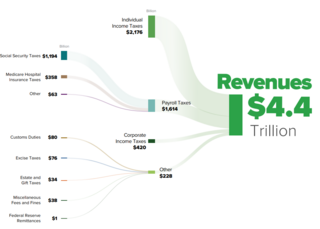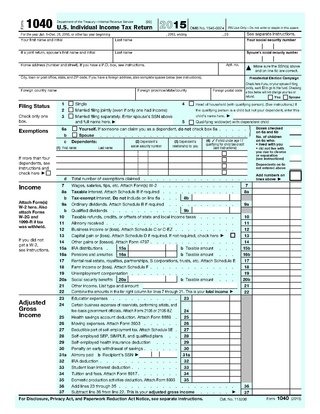
The United States of America has separate federal, state, and local governments with taxes imposed at each of these levels. Taxes are levied on income, payroll, property, sales, capital gains, dividends, imports, estates and gifts, as well as various fees. In 2020, taxes collected by federal, state, and local governments amounted to 25.5% of GDP, below the OECD average of 33.5% of GDP.

Payroll taxes are taxes imposed on employers or employees, and are usually calculated as a percentage of the salaries that employers pay their employees. By law, some payroll taxes are the responsibility of the employee and others fall on the employer, but almost all economists agree that the true economic incidence of a payroll tax is unaffected by this distinction, and falls largely or entirely on workers in the form of lower wages. Because payroll taxes fall exclusively on wages and not on returns to financial or physical investments, payroll taxes may contribute to underinvestment in human capital, such as higher education.

The Federal Insurance Contributions Act is a United States federal payroll tax payable by both employees and employers to fund Social Security and Medicare—federal programs that provide benefits for retirees, people with disabilities, and children of deceased workers.
Tax exemption is the reduction or removal of a liability to make a compulsory payment that would otherwise be imposed by a ruling power upon persons, property, income, or transactions. Tax-exempt status may provide complete relief from taxes, reduced rates, or tax on only a portion of items. Examples include exemption of charitable organizations from property taxes and income taxes, veterans, and certain cross-border or multi-jurisdictional scenarios.
In the United States income tax system, adjusted gross income (AGI) is an individual's total gross income minus specific deductions. It is used to calculate taxable income, which is AGI minus allowances for personal exemptions and itemized deductions. For most individual tax purposes, AGI is more relevant than gross income.

Employee benefits and benefits in kind, also called fringe benefits, perquisites, or perks, include various types of non-wage compensation provided to employees in addition to their normal wages or salaries. Instances where an employee exchanges (cash) wages for some other form of benefit is generally referred to as a "salary packaging" or "salary exchange" arrangement. In most countries, most kinds of employee benefits are taxable to at least some degree. Examples of these benefits include: housing furnished or not, with or without free utilities; group insurance ; disability income protection; retirement benefits; daycare; tuition reimbursement; sick leave; vacation ; social security; profit sharing; employer student loan contributions; conveyancing; long service leave; domestic help (servants); and other specialized benefits.
The Federal Unemployment Tax Act is a United States federal law that imposes a federal employer tax used to help fund state workforce agencies. Employers report this tax by filing Internal Revenue Service Form 940 annually. In some cases, employers are required to pay the tax in installments during the tax year.
The Internal Revenue Code of 1986 (IRC), is the domestic portion of federal statutory tax law in the United States. It is codified in statute as Title 26 of the United States Code. The IRC is organized topically into subtitles and sections, covering federal income tax in the United States, payroll taxes, estate taxes, gift taxes, and excise taxes; as well as procedure and administration. The Code's implementing federal agency is the Internal Revenue Service.
A gift tax, known originally as inheritance tax, is a tax imposed on the transfer of ownership of property during the giver's life. The United States Internal Revenue Service says that a gift is "Any transfer to an individual, either directly or indirectly, where full compensation is not received in return."

An S corporation, for United States federal income tax, is a closely held corporation that makes a valid election to be taxed under Subchapter S of Chapter 1 of the Internal Revenue Code. In general, S corporations do not pay any income taxes. Instead, the corporation's income and losses are divided among and passed through to its shareholders. The shareholders must then report the income or loss on their own individual income tax returns.
For households and individuals, gross income is the sum of all wages, salaries, profits, interest payments, rents, and other forms of earnings, before any deductions or taxes. It is opposed to net income, defined as the gross income minus taxes and other deductions.

The United States federal government and most state governments impose an income tax. They are determined by applying a tax rate, which may increase as income increases, to taxable income, which is the total income less allowable deductions. Income is broadly defined. Individuals and corporations are directly taxable, and estates and trusts may be taxable on undistributed income. Partnerships are not taxed, but their partners are taxed on their shares of partnership income. Residents and citizens are taxed on worldwide income, while nonresidents are taxed only on income within the jurisdiction. Several types of credits reduce tax, and some types of credits may exceed tax before credits. Most business expenses are deductible. Individuals may deduct certain personal expenses, including home mortgage interest, state taxes, contributions to charity, and some other items. Some deductions are subject to limits, and an Alternative Minimum Tax (AMT) applies at the federal and some state levels.
Section 61 of the Internal Revenue Code defines "gross income," the starting point for determining which items of income are taxable for federal income tax purposes in the United States. Section 61 states that "[e]xcept as otherwise provided in this subtitle, gross income means all income from whatever source derived [. .. ]". The United States Supreme Court has interpreted this to mean that Congress intended to express its full power to tax incomes to the extent that such taxation is permitted under Article I, Section 8, Clause 1 of the Constitution of the United States and under the Constitution's Sixteenth Amendment.
Old Colony Trust Co. v. Commissioner, 279 U.S. 716 (1929), was an income tax case before the Supreme Court of the United States.

A cafeteria plan or cafeteria system is a type of employee benefit plan offered in the United States pursuant to Section 125 of the Internal Revenue Code. Its name comes from the earliest such plans that allowed employees to choose between different types of benefits, similar to the ability of a customer to choose among available items in a cafeteria. Qualified cafeteria plans are excluded from gross income. To qualify, a cafeteria plan must allow employees to choose from two or more benefits consisting of cash or qualified benefit plans. The Internal Revenue Code explicitly excludes deferred compensation plans from qualifying as a cafeteria plan subject to a gross income exemption. Section 125 also provides two exceptions.

Hornung v. Commissioner is a case heard by the United States Tax Court in 1967.
Internal Revenue Code Section 132(a) provides eight types of fringe benefits that are excluded from gross income. These include fringe benefits which qualify as a (1) no-additional-cost service, (2) qualified employee discount, (3) working condition fringe, (4) de minimis fringe, (5) qualified transportation fringe, (6) qualified moving expense reimbursement, (7) qualified retirement planning services, or (8) qualified military base realignment and closure fringe.
De minimis fringe benefits are low-value perks provided by an employer; de minimis is legal Latin for "minimal".
An employer in the United States may provide transportation benefits to their employees that are tax free up to a certain limit. Under the U.S. Internal Revenue Code section 132(a), the qualified transportation benefits are one of the eight types of statutory employee benefits that are excluded from gross income in calculating federal income tax. The qualified transportation benefits are transit passes, vanpooling, bicycling, and parking associated with these things.
Section 79 of the U.S. Internal Revenue Code sets out the U.S. Federal income tax law concerning term life insurance plans provided by employers. Tax benefits are available for both employers and participating employees, under certain conditions.







